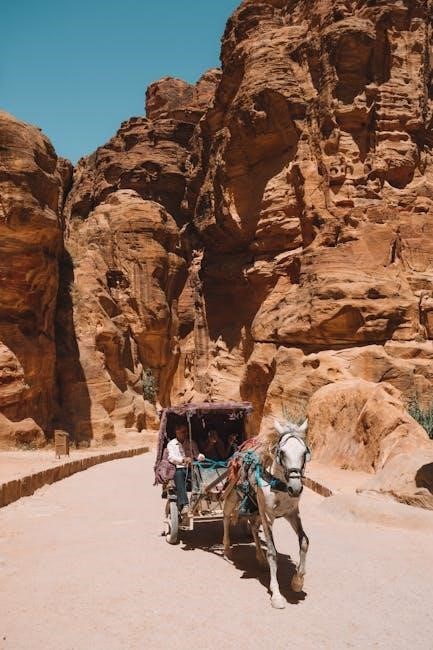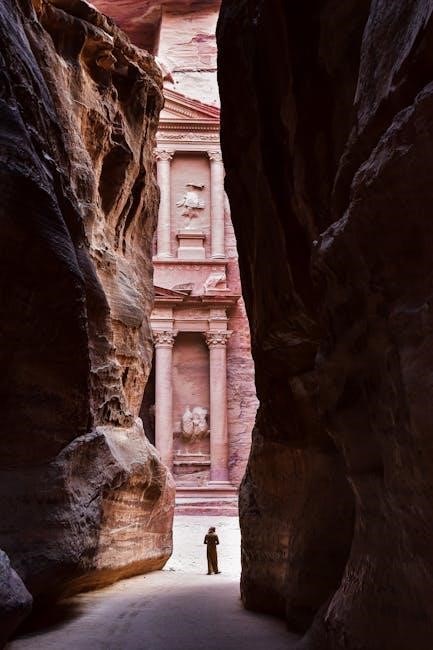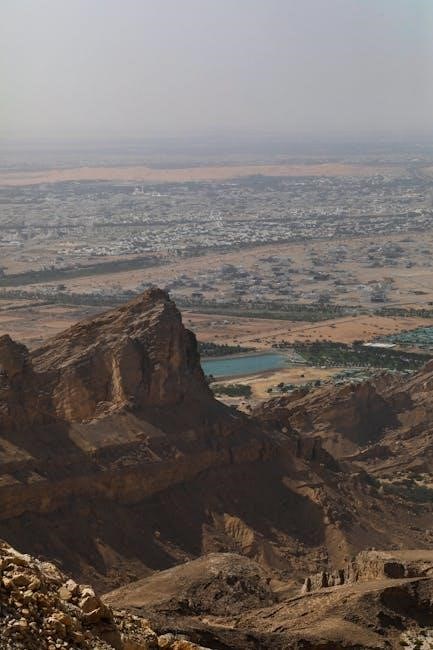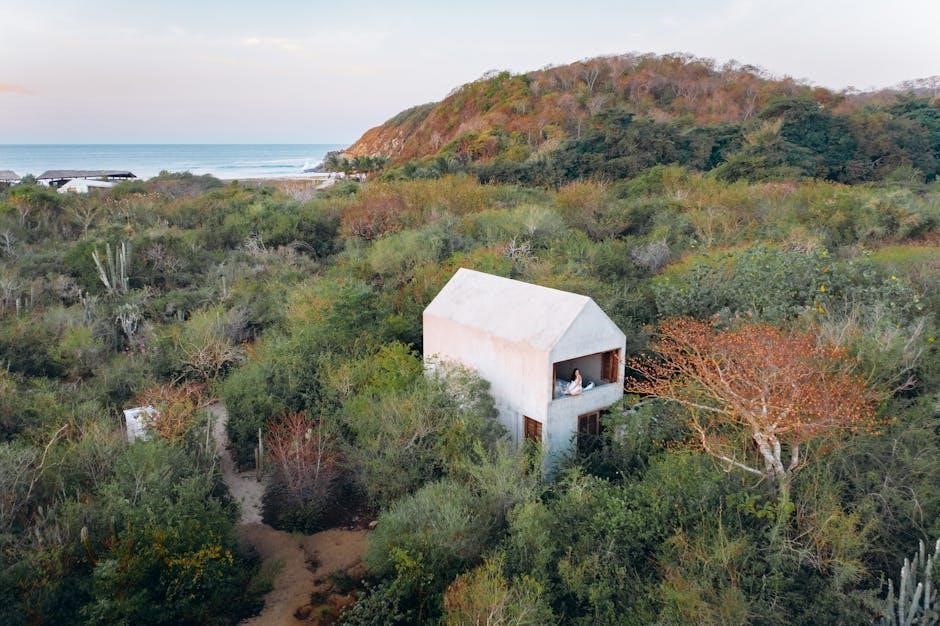Other Desert Cities by Jon Robin Baitz is a dark comedy exploring family dynamics, memory, and political tension․ Set in Palm Springs during Christmas, it follows Brooke Wyeth’s return home, sparking conflict with her announcement of a controversial memoir․ A Pulitzer Prize finalist, the play delves into themes of truth, betrayal, and identity, offering sharp dialogue and emotional depth․
Overview of the Play
Other Desert Cities, written by Jon Robin Baitz, is a dark comedy that revolves around the Wyeth family’s Christmas gathering in Palm Springs, 2004․ Brooke Wyeth, a novelist, returns home after six years to announce the publication of her memoir, which dredges up a tragic family secret․ This revelation sparks tension and conflict among her parents, Lyman and Polly, and her brother, Trip, as they confront their past and differing perspectives on truth and memory․ A Pulitzer Prize finalist, the play is celebrated for its sharp dialogue and emotional depth, offering a poignant exploration of family dynamics, political undertones, and personal identity․ Its acclaim includes the Outer Critics Circle Award for Outstanding New Off-Broadway Play, showcasing its resonance with audiences and critics alike․
Historical and Cultural Context
Other Desert Cities is set against the backdrop of the early 2000s, a time marked by political turmoil and social change in America․ The play reflects the tension between the Iraq War and domestic politics, as the Wyeth family, with their Republican ties, grapples with their own history․ The setting of Palm Springs, a desert city symbolic of luxury and escape, contrasts with the darker themes of family secrets and historical reckoning․ Brooke’s memoir serves as a catalyst, forcing the family to confront their past and the cultural divides of their time․
Themes in “Other Desert Cities”
Other Desert Cities explores themes of truth vs․ memory, family conflict, and political commentary․ The play delves into the clash of personal and collective histories, revealing how memories shape identities and relationships, while also critiquing societal norms and political ideologies through the Wyeth family’s dynamics․
Truth vs․ Memory
In Other Desert Cities, the tension between truth and memory is central․ Brooke’s memoir forces her family to confront their shared past, revealing how subjective memories can distort truth․ Each character’s perspective reflects their own biases and fears, illustrating how history can be both personal and political․ The play questions whether truth can ever be fully known or if it remains forever filtered through individual recollections and emotions, creating a complex web of understanding and conflict․
Family Dynamics and Conflict
Other Desert Cities delves into the intricate and tense relationships within the Wyeth family․ Brooke’s announcement of her memoir reignites long-simmering conflicts, exposing deep-seated resentments and unresolved wounds․ Each family member reacts based on their own perceptions and past experiences, highlighting the fragility of their bonds․ The play portrays how secrets, misunderstandings, and differing values can fracture even the closest of family ties, creating a volatile atmosphere of confrontation and emotional reckoning․
Political and Social Commentary
Other Desert Cities serves as a sharp critique of American politics and societal norms․ The Wyeth family, rooted in political prominence, grapples with their past and its implications․ Baitz uses dark comedy to explore themes of war, governance, and the clash of ideologies․ The play reflects on the personal costs of public life, offering a scathing look at the privilege and hypocrisy often tied to power․ Its timely commentary resonates with broader societal issues, making it a compelling reflection of modern America․
Characters and Their Roles
Brooke Wyeth, a novelist, returns home, confronting her family’s secrets․ Lyman and Polly, her politically prominent parents, guard the past, while Trip, her brother, navigates the family’s complex dynamics․
Brooke Wyeth
Brooke Wyeth is the protagonist, a novelist who returns to her family’s Palm Springs home after a six-year absence․ Her announcement of a memoir reveals a tragic family secret, sparking tension․ Brooke’s decision underscores her struggle with identity, truth, and loyalty․ Her sharp wit and emotional depth make her a complex character, driven by a need to confront the past, even as it strains her relationships with her parents, Lyman and Polly, and her brother, Trip․
Lyman and Polly Wyeth
Lyman and Polly Wyeth are Brooke’s parents, portrayed as a politically conservative couple․ Their lives are marked by a tragic family event, which Brooke’s memoir threatens to expose․ Lyman, a former actor, and Polly, a staunch Republican, embody the tension between public image and private pain․ Their complex dynamics with Brooke reveal a mix of love, resentment, and a desire to protect their legacy, highlighting the challenges of family loyalty and historical truth․
Trip Wyeth
Trip Wyeth is Brooke’s younger brother, who manages a reality TV show․ His humor and detachment mask his own struggles with identity and family history․ Unlike Brooke, Trip avoids confrontation, often mediating between his parents and sister․ His character serves as a bridge between generations, offering a modern perspective while navigating the complexities of his family’s past, revealing vulnerability beneath his carefree facade․ His role underscores the play’s exploration of sibling dynamics and shared trauma․

The Setting of the Play
Other Desert Cities unfolds in the Wyeth family home in Palm Springs, a desert city reflecting 1960s elegance․ The setting mirrors the characters’ emotional isolation and the clash between past and present, creating a backdrop for their tense reunion and the revelation of long-buried secrets․ The desert environment symbolizes both beauty and desolation, amplifying the play’s themes of family conflict and societal change․
Palm Springs as a Desert City
Palm Springs, a quintessential desert city, serves as the backdrop for Other Desert Cities․ Its mid-century modern architecture, lush oases, and stark desert landscapes symbolize both luxury and emptiness․ The city’s reputation as a retreat for Hollywood elite contrasts with the Wyeth family’s internal turmoil․ The setting underscores themes of isolation, nostalgia, and the clash between illusion and reality, making Palm Springs a character in itself, shaping the family’s dynamics and emotional struggles during their Christmas reunion․
The Significance of the Wyeth Family Home
The Wyeth family home in Palm Springs embodies the play’s themes of nostalgia and tension․ Its mid-century modern design, featuring a Scandinavian-inspired fireplace and Desert-French regency decor, reflects the family’s elite status and storied past․ The home serves as both a sanctuary and a prison, where memories of glory and loss linger․ It becomes a stage for the family’s emotional confrontations, symbolizing the gap between their polished facade and the turmoil beneath, as Brooke’s revelations disrupt the fragile harmony during their Christmas reunion;
Symbolism and Motifs
In Other Desert Cities, the desert symbolizes isolation and the family’s emotional aridity, while Christmas represents strained unity and suppressed conflicts․
The Desert as a Symbol
The desert in Other Desert Cities symbolizes both isolation and the harsh beauty of unresolved family conflicts․ Its arid landscape mirrors the emotional barrenness of the Wyeths, highlighting their disconnection and unspoken secrets․ The setting of Palm Springs, with its blend of luxury and desolation, serves as a backdrop for the characters’ inner turmoil․ The desert’s vastness underscores the themes of memory, identity, and the clash between past and present, creating a poignant metaphor for the family’s fractured dynamics and unhealed wounds․
Christmas as a Symbolic Setting
Christmas in Other Desert Cities serves as a symbolic backdrop, contrasting the festive ideals of unity and joy with the Wyeth family’s fractured relationships․ The holiday setting amplifies the tension, as Brooke’s announcement disrupts the family’s fragile peace․ The contrast between the desert’s stark beauty and the traditional warmth of Christmas highlights the characters’ emotional distance and unresolved conflicts, using the season as a catalyst for confronting their past and the truth they’ve avoided․

Critical Reception and Impact
Other Desert Cities is a Pulitzer Prize-finalist play praised for its sharp dialogue and emotional depth․ It won the Outer Critics Circle Award for Outstanding New Off-Broadway Play, with Ben Brantley of The New York Times calling it a “scintillating and sharply observed dark comedy․” This acclaim highlights its impact on contemporary theater․
Awards and Nominations
Other Desert Cities earned significant recognition, including a Pulitzer Prize nomination for Drama․ It also won the Outer Critics Circle Award for Outstanding New Off-Broadway Play, showcasing its critical acclaim․ These honors underscore the play’s masterful storytelling and complex character dynamics, solidifying its place in modern theater․
Reviews and Analysis
Critics praise Other Desert Cities for its sharp dialogue and nuanced exploration of family and memory․ Reviewers highlight its ability to blend humor with emotional depth, creating a compelling narrative․ The play’s portrayal of political and personal conflicts resonates deeply, making it a standout in contemporary theater․ Its critical success is evident in its reception as a thought-provoking and emotionally charged drama․

The Play’s Availability as a PDF
Other Desert Cities is widely available as a PDF, accessible through various online platforms; Users can download the script legally from authorized sources or purchase it․
Downloading and Accessing the Script
To download Other Desert Cities as a PDF, users can utilize platforms like Google Books or online script repositories․ By filtering search results for PDFs, fans can easily locate and access the play․ Legal purchase options are also available through ebook stores, ensuring compliance with copyright laws while supporting the playwright․ This accessibility allows readers to engage deeply with the themes and characters of the acclaimed drama․
Legal and Ethical Considerations
Accessing Other Desert Cities as a PDF requires adherence to copyright laws․ Downloading or sharing the script without authorization is illegal and unethical․ Purchasing from official sources supports the playwright and protects their rights․ Users should avoid pirated copies to ensure compliance with legal standards and respect for the creator’s work․ Ethical access promotes sustainability in the arts and upholds the value of intellectual property․
Other Desert Cities is a compelling exploration of family, memory, and political conflict․ Its thought-provoking themes and sharp dialogue make it a significant work in contemporary theater, offering lasting relevance and emotional resonance for audiences․
Final Thoughts on the Play’s Relevance
Other Desert Cities remains a poignant commentary on family dynamics, political tensions, and the fragility of memory․ Its exploration of complex relationships and societal issues resonates deeply, making it a timeless piece; The play’s ability to weave personal and political narratives highlights its relevance in understanding human struggles․ Its sharp dialogue and emotional depth ensure its continued impact on both stage and readers alike, offering fresh insights with each interpretation․
Recommendations for Further Reading
For deeper insight into Other Desert Cities, readers can explore the PDF version of the script, available online, to analyze dialogue and themes․ Essays and critical analyses provide academic perspectives on the play’s exploration of family dynamics and memory․ Reviews from sources like The New York Times offer valuable critiques, while interviews with Jon Robin Baitz shed light on his creative process․ These resources enhance understanding of the play’s relevance and artistic impact․
